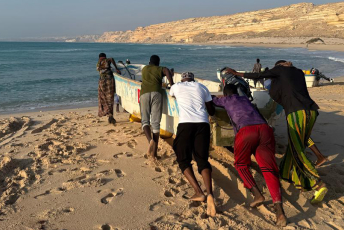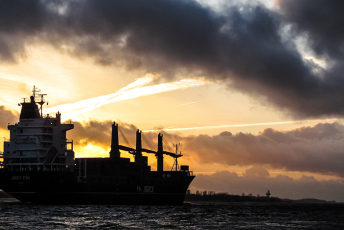The Gulf of Guinea spans a coastline of over 6 000 km, including territories in Central and West Africa from Angola to Senegal. Controlling activities in this large maritime domain poses serious challenges for states and regional bodies alike.
The size of the region, combined with weak governance, makes the administration of this maritime domain almost impossible and criminality has developed over the years. There has been a spike in maritime piracy and armed robbery at sea as violent militancy in Nigeria’s Niger Delta region peaked around 2006 and spread across the Gulf region. In 2007, as many as 100 attacks against vessels were recorded. The number of these declined following an amnesty in 2009 between the government of Nigeria and militants, but rose again ‘when President Buhari suspended the amnesty in 2015’ – according to an observer met in the Niger Delta in September 2018.
The International Maritime Bureau, a division of the International Chamber of Commerce, indicated that in 2017, the Gulf of Guinea had the highest number of reported incidents of piracy and armed robbery at sea in the world. The rest of the world was at a 22-year low. The report noted the kidnapping of 102 crew members between January and June 2018, compared with 63 kidnappings over the same period in 2017.
Piracy is not the only cause of maritime instability and insecurity in the Gulf of Guinea. Other governance challenges include transnational organised crimes (TOCs) such as illegal fishing, and associated crimes such as drug smuggling through fishing vessels. In 2011, a United Nations Office on Drugs and Crime (UNODC) report on TOC in the fishing industry noted that ‘structured criminal networks’ carrying out marine resource-related crimes are also involved in drug smuggling, human trafficking, money laundering and corruption.
Drug smuggling, for example, has evolved to become a transnational criminal activity controlled by West African networks. At first, small fishing vessels from Togo, Ghana, Benin and Nigeria were used as ‘mules’ for Latin American cocaine traffickers. Thereafter, the mules reportedly set up their own transport and distribution systems as ‘a safer alternative than high-risk smuggling on commercial planes, which can more easily be interdicted by police’, according to the UNODC in 2013. A 2018 report by the Real Instituto Elcano found that West African countries are ‘a significant transit zone for drug trafficking from South America to Europe’, due to weak law enforcement capabilities, corruption and porous borders.
However, despite the diversity of maritime crimes, responses to the complex security threats in the Gulf of Guinea have been one-sided. These responses have focused primarily on piracy, and fall under the so-called Yaoundé architecture, born out of the Summit of Heads of State and Government on Maritime Safety and Security in the Gulf of Guinea. Held in Yaoundé, Cameroon, in June 2013, the summit resulted in the adoption of the 2013 Code of Conduct on the prevention and repression of piracy, armed robbery against ships, and illegal maritime activities in Central and West Africa.
It led in 2015 to the creation of the Inter-regional Coordination Centre (ICC) under the auspices of the Economic Community of West African States (ECOWAS), the Economic Community of Central African States (ECCAS), and the Gulf of Guinea Commission (GGC).
The code of conduct focuses notably on ‘TOC in the maritime domain’, which includes money laundering, illegal arms and drug trafficking, maritime pollution, theft of crude oil, piracy and armed robbery at sea, human smuggling, and illegal dumping of toxic waste, among other sea-based crimes.
To address insecurity and promote development in the maritime domain, the Gulf of Guinea Commission was established in 1999, and subsequently two regional centres for maritime security: CRESMAC in 2012 under ECCAS, and CRESMAO in 2014 under ECOWAS. They are supported by zonal (multinational and regional) centres for maritime coordination and information sharing.
The African Union (AU) developed the 2050 Africa’s Integrated Maritime Strategy and the 2016 African Charter on Maritime Security and Safety and Development in Africa (Lomé Charter), which provide a broad framework for addressing maritime security at continental level and apply to the Gulf of Guinea.
Despite these initiatives, piracy and the other forms of TOC continue to prevail in the region. Several factors explain the failure to stem TOC or mitigate its impact on the Gulf of Guinea. Some of these are inherent to the structural organisation of existing regional mechanisms. Principally, the general architecture for dealing with TOC is too complex, with very little coordination between implementing actors.
One reason is that many of these institutions have similar missions and objectives, which put them in competition for resources. For instance, the ICC – which was set up to implement the Yaoundé Code of Conduct – has not seen practical coordination on the ground since coming into effect in 2016. Only a few of the coordination centres mentioned above are currently operational, which hampers the effectiveness of the regional security mechanism. This has resulted in widespread impunity, which has benefited and emboldened cross-border and transnational criminal groups. ‘Today in the Gulf of Guinea, there is zero case of criminal prosecution of maritime piracy, and it is not possible to think of intervention at sea without thinking about prosecution’, one expert noted.
This does not mean that securing the maritime domain in the region is impossible, but a shift in strategy and attitude is needed. Illicit activities at sea are crimes and threats to peace and security, and responding to them requires a holistic approach. Partners of the Gulf of Guinea such as the USA, the European Union and others have preferred to support regional mechanisms, led by the AU and regional economic communities.
They need to work with the Yaoundé architecture institutions such as the ICC and the GCC, to strengthen their technical capacities, and their sustainability. But a shift in strategy also means working at national levels to criminalise piracy, illegal fishing and other transnational maritime offences. On a less sophisticated level, concerned actors also need to sensitise and engage coastal communities, which stand to benefit the most from safe and sustainable oceans.
Agnes Ebo’o, ENACT Regional Organised Crime Observatory coordinator – Central Africa, ISS







